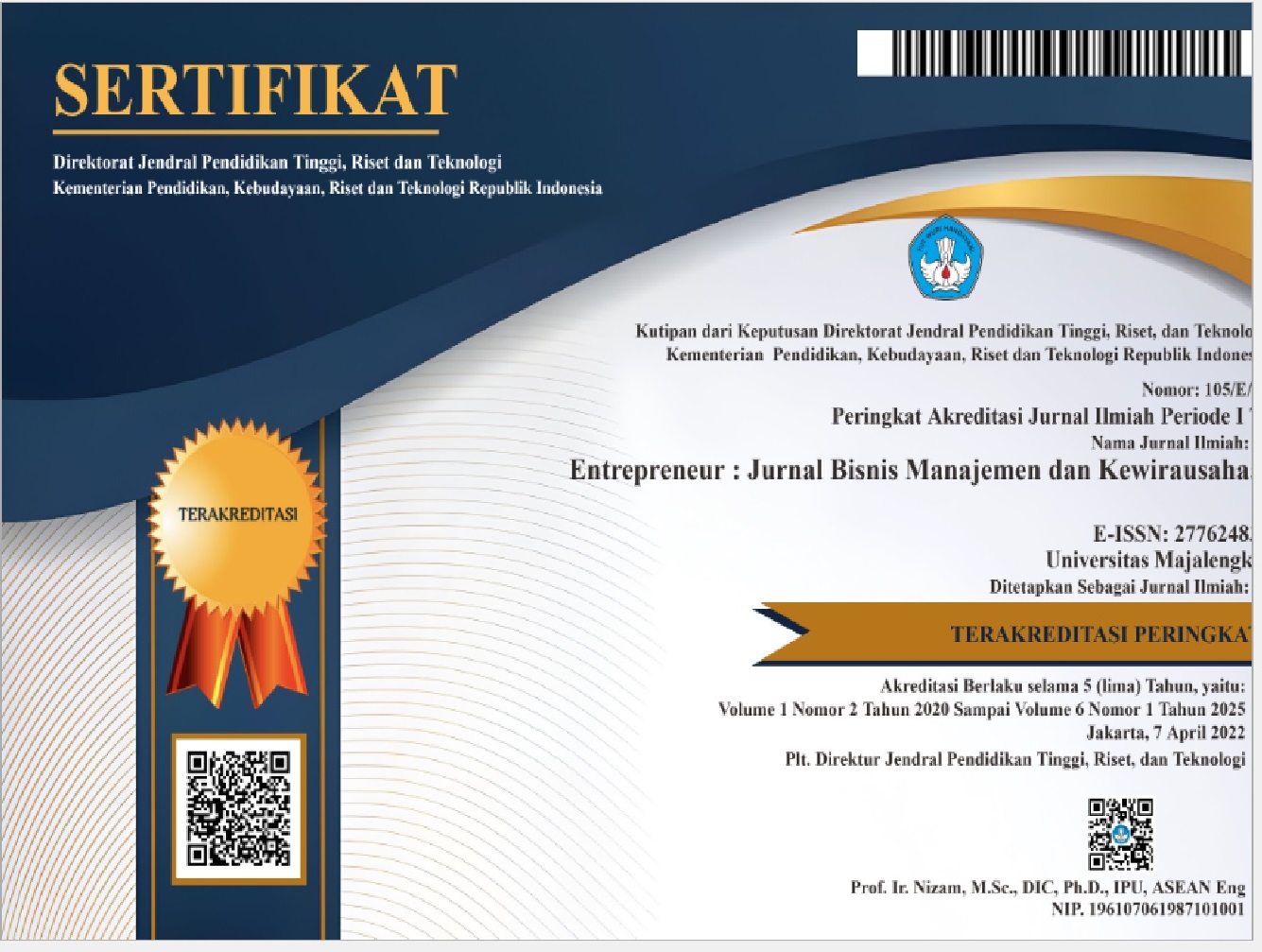Pengaruh Self Efficacy dan Locus Of Control Terhadap Kinerja Karyawan Dengan Kepribadian Sebagai Variabel Moderating (Studi Pada Pt. Wijaya Karya Beton, Tbk Ppb Majalengka)
DOI:
https://doi.org/10.31949/entrepreneur.v1i1.876Abstract
This study aims to determine the effect of self-efficacy and locus of control with personality asa modifying variable on the performance of employees of PT. Wijaya Karya Beton, Tbk PBBMajalengka. The data source in this research is primary data. The study population was allemployees totaling 69 people. The sampling technique uses census techniques, where theentire population is used as a sample. The data collection instrument used a questionnaire.Data analysis techniques using Moderate Regression Analysis (MRA). The results of theanalysis show that partially self-efficacy and locus of control have a positive and significanteffect on employee performance. Likewise, the presence of personality as a moderatingvariable further strengthens the effect of self-efficacy and locus of control on employeeperformance. therefore the company must pay attention to individual beliefs, and expectationsof their ability to achieve the goals of each job will depend on their level of confidence andself-confidence by increasing the capacity of employees through training activities and so on
Keywords:
Self Efficacy, Locus Of Personality Control, PerformanceDownloads
References
Alwisol. 2009. Psikologi Kepribadian edisi Revisi. Malang: Universitas Muhammadiyah Malang Press Anwar Prabu Mangkunegara , 2005 “Manajemen sumber daya manusia” . Perusahaan PT Remaja Rosda Karya; Bandung.
Chamariyah, 2015 “Pengaruh self efficacy, Assertiveness, dan self esteem terhadap keinginan pindah kerja (turnover intentions) pegawai (Studi bank jatim cabang pamekasan) Jurnal Ne0-Bis Vol.3, No.1
Edwin B. Flippo, 2012. “Personel Management (Manajemen Personalia), Edisi VII Jilid II, Terjemahan Alponso S” Jakarta; Erlangga
Friedman, Howards S., & Miriam Schustack. (2006). Kepribadian: Teori Klasik dan Riset Modern. Jakarta: Erlangga
Husein Umar, 2003, Metodologi Penelitian Untuk Bisnis, Jakarta; PT. Gramedia Pustaka.
Imam. Ghozali 2006. Aplikasi Analisis Multivariate Dengan Program SPSS. Cetakan Keempat. Semarang: Badan Penerbit Universitas Diponegoro.
Kerlinger. 1973. Metode penelitian. Jakarta: Erlangga
Andayani, S. A., Sumekar, Y., & Suhaeni, J. S. (2020). Supply chain risk classification shallot agribusiness in the Highland through analytical hierarchy process approach. focus, 8.
Andayani, S. A., & Sumekar, Y. (2020). Prediction analysis model of nira production in arenga pinnata by using adaptive neuro-fuzzy inference system method. Thematics Journal of Botany, 4(2).
Ginanjar, Y., Rahmayani, M. W., & Riyadi, W. (2019). Identifikasi faktor penyebab tingkat audit delay di bursa efek indonesia. Jurnal Kajian Akuntansi, 3(2), 210-222.
Amin, M. A. S. (2020). Communication Activities Seba Baduy Lebak Regency Banten. Budapest International Research and Critics Institute (BIRCI-Journal): Humanities and Social Sciences, 3(1), 73-80.
Amin, M. A. S. (2020). Communication Activities in Mitoni Events in Layansari Village (Study of Communication Ethnography Regarding Communication Activities at the Mitoni Event in Layansari Village, Gandrungmangu District, Cilacap Regency in requesting the safety of Mother and Child). Budapest International Research and Critics Institute-Journal (BIRCI-Journal), 3(2), 1289-1296.
Koentjaraningrat. 1993. “Metode-metode Penelitian Masyarakat”. Jakarta; PT. Gramedia Pustaka Utama.
Malayu, S.P. Hasibuan, 2007. “Manajemen Sumber DayaManusia”. Jakarta : Cetakan 9. PT. Bumi Aksara.
Mathis, dan Jackson, 2006, Manajemen Sumber Daya Manusia, Edisi pertama, Cetakan Pertama, Yogyakarta : Salemba Empat
Moh Nazir. (2003),Metode Penelitian, Salemba Empat, Jakarta
Arikunto, S (2002). Prosedur Penelitian, Suatu Pendekatan Praktek. Jakarta: PT Rineka Cipta
Ruky , 2004 “Sistem manajemen kinerja”, Gramedia pustaka utama. Jakarta
Robbins SP, dan Judge. 2007. Perilaku Organisasi, Jakarta: Salemba Empat
Setiadi, 2003 “Teori kepribadian”, Bumi aksara; Jakarta
Simanjuntak, Payaman J. 2005. Manajemen dan Evaluasi Kerja. Lembaga Penerbit FEUI, Jakarta.
Sugiono, 2013 “Statistika untuk penelitian”, Alfabeta; Bandung
Published
How to Cite
Issue
Section
License

This work is licensed under a Creative Commons Attribution-ShareAlike 4.0 International License.
COPYRIGHT NOTICE
An author who publishes in the Entrepreneur: Jurnal Bisnis Manajemen dan Kewirausahaan agrees to the following terms:
1. Author retains the copyright and grants the journal the right of first publication of the work simultaneously licensed under the Creative Commons Attribution-ShareAlike 4.0 License that allows others to share the work with an acknowledgment of the work's authorship and initial publication in this journal
2. The author is able to enter into separate, additional contractual arrangements for the non-exclusive distribution of the journal's published version of the work (e.g., post it to an institutional repository or publish it in a book) with the acknowledgment of its initial publication in this journal.
3. The author is permitted and encouraged to post his/her work online (e.g., in institutional repositories or on their website) prior to and during the submission process, as it can lead to productive exchanges, as well as earlier and greater citation of the published work








